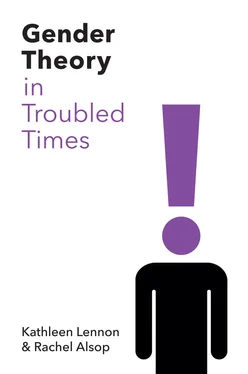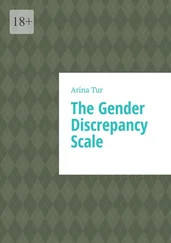The reinforcement of gender essentialism in everyday life runs alongside a sinister reinforcement taking place politically across the globe in which claims of gender essentialism – an insistence on natural or God-given differences between men and women that indicate appropriate social roles – are being harnessed to bolster right-wing populist claims and new nationalisms, often interwoven with influence from the religious right. These claims are linked to attacks particularly on the reproductive rights of women and are threatening to the legitimacy of LGBTQI+ communities. In recent years these movements have launched attacks on gender theory itself (Meret and Siim 2013; Kuhar and Paternotte 2017; von Redecker 2018; Kantola and Lombardo 2019). We turn to these developments below.
Gender essentialism has also returned within the feminist community, particularly but not exclusively in the UK, around the question of the rights of trans women. Interestingly, the debate is concerned primarily with the status of trans women rather than trans men. But some organizations made up of women suggest that WNT (women who are not trans) will suffer if the boundaries are drawn to include TW (trans women) as women (Murray 2017). 1In this book we both draw the boundaries to include trans women and argue that this is an appropriate place to draw them. We refute the suggestion that this damages the interests of women with intersectional identities of other kinds (see discussions in chapters 5and 7). We also return to these points further below.
The rise of right-wing populism
We, the authors of this text, are white, English-speaking, European, cis gender women (women whose claimed gender corresponds to the gender they were assigned at birth) working as academics in the UK. This locatedness is evident in the work that follows, though we endeavour to engage with voices from other perspectives. It is also evident in our viewing the times in which we are writing as particularly troubled for those seeking to promote gender equality. While resisting a simple progressive narrative of history, we acknowledge at the time of our writing a backlash against gained gender equality in many parts of the world, as well as the ongoing oppression and marginalization of women and sexual minorities in many others. We acknowledge that all times are troubled and troubling. However, we wish to point here to certain features of current concern which underscore our insistence that how we theorize gender is of immediate political importance.
A disturbing truth is that 53 per cent of white women in the United States voted for Donald Trump in the US elections held in 2016, despite widespread indication of his misogyny and his opposition to women’s sexual and reproductive rights (Darweesh and Abdullah 2016; Ratliff et al. 2017; Valentino et al. 2018); 94 per cent of black women voted for Hillary Clinton. The more progressive gender agenda was thus supported in that election by black and Latino women. What this has helped clarify is that the possibilities of both a just anti-racist society and a society which promotes the rights of women and the LGBTQI+ community are interdependent. Gender rights intersect with rights of other marginalized peoples. Thus, being concerned with multiple axes of oppression globally is not an add-on for feminism. It is a condition of its survival. Trump’s opposition to gender and sexual rights and their interconnections with his anti-immigration policies are typical of right-wing populism. ‘The few gender issues that appear on the far-right agenda support traditional family and conservative gender roles, and unashamedly oppose women’s sexual and reproductive rights and LGBT rights. … Gender equality discourse is instrumentalised against immigration … and feminist politics is framed as a dangerous “gender ideology”’ (Kantola and Lombardo 2019: 3–4).
Judith Butler points also to the ways in which the language and politics of gender and sexual equality are manipulated to argue against immigration. In Frames of War she asserts that ‘in recent years the positions associated with sexual progressive politics have been pitted against claims for new immigrant rights and new cultural exchanges in the US and Europe’ (2010: 27). One narrative put forward is this: in the US and Europe there are progressive values that give equal rights to women, allow gay marriage and respect gender fluidity. But other cultures, particularly Muslim cultures, are represented as backward in this respect, and this is used to justify rejection of individuals and even military adventures in predominantly Muslim countries. In this narrative, many of the things for which feminists and LGBTQI+ activists have been fighting are appropriated to ensure that the rights and dignity of migrants and minorities are positioned as somehow in opposition to gender and sexuality rights. Paradoxically, such a position is taken while at the same time the very same gender rights are being undermined.
The interweaving of nationalism and right-wing populism manifest in Trump’s United States is found in many other parts of the world. And the same pattern is repeated: chauvinistic nationalism is accompanied by attacks on gender rights (Alsop and Hockey 2001; Yilmaz 2012; Meret and Siim 2013). ‘It’s a vision of the world in which men are superior to women, inequality is the name of the game and tradition is what’s being protected by these authoritarian rulers’ (Scott 2018). Poland, Hungary and Brazil are striking examples, but there are strands throughout Europe and elsewhere (Meret and Siim 2013; Verloo 2018; Kantola and Lombardo 2019). Globally we see a resurgence of populist politics both on the left (the Podemos movement in Spain or Syriza in Greece, for example) and on the right (elections of Trump in the US and Bolsonaro in Brazil; or the emergence of the Finns Party in Finland or One Nation in Australia). Focusing specifically on the emergence of right-wing populist politics, Kantola and Lombardo point to the ways in which ‘Feminist studies have shown how the discourse of radical right groups is visibly anti-feminist, anti-LGBT, conservative, nationalist, racist, xenophobic, Islamophobic and anti-democratic’ (2019: 3).
There is an interweaving of such right-wing populism with religious fundamentalism, which informs the attack on gendered rights. In Poland, for example, the nationalist Law and Justice party, closely aligned with a conservative Catholic Church, was elected in 2015 and tried to impose a full ban on abortion, which was narrowly defeated. Attempts to restrict access to abortion are ongoing, and LGBTQI+ people in Poland continue to encounter discrimination. In Hungary, there are parallel developments in which church and state seek to roll back women’s reproductive rights and the rights of sexual minorities to reinstate a traditional model of the family as a natural, God-given institution which is under attack (Peto 2016). Jair Bolsonaro became president of Brazil with a campaign that targeted the rights of women and was abusive to the LGBTQI+ community. His campaign was supported by conservative Pentecostal groups and was accompanied by alarming increases in violent deaths related to homophobia alongside racialized violence and increased violence against women. ‘In his post-election-victory speech, Bolsonaro said his campaign had relied on the Bible, “the toolbox to fix men and women”’ (Assis and Ogando 2018).
The authoritarian attack on gendered rights is found not only in states with unholy alliances with varieties of Christianity. Turkey, as part of its post-2016 coup, launched a crackdown on civil society, put LGBTQI+ defenders in prison, and fired rubber bullets at a Pride march in Istanbul. Turkey’s President Erdoğan consistently reinforces women’s traditional role within the family and society, ‘declaring that women are not equal to men … and that biological differences meant women and men could not serve the same functions, adding that manual work was unsuitable for the “delicate nature” of women’ (Agence France-Presse 2014). Here the resurgent nationalisms target Kurdish minorities as well as the migrants from Syria who are targets of the right across Europe. A recent AIDA report on Turkey suggests that ‘the vulnerability of migrant women, especially of single women, to all types of sexual harassment and assault is high and invisible. This makes them a potential target of not only the local population … which are generally very conservative, but also of male public officials who mostly rely on the impunity tradition of the Turkish state’ (AIDA 2018).
Читать дальше












